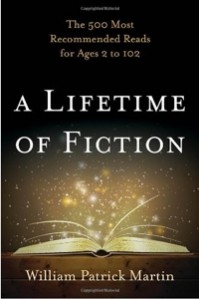 This month Rowman & Littlefield published a book by William Patrick Martin titled A Lifetime of Fiction: The 500 Most Recommended Reads for Ages 2 to 102, and Updike’s Rabbit series is Number 1 of 100 books listed in the Adults (Ages 18+) section. In recommending Updike to readers, Martin offers more of a description than a reason for reading:
This month Rowman & Littlefield published a book by William Patrick Martin titled A Lifetime of Fiction: The 500 Most Recommended Reads for Ages 2 to 102, and Updike’s Rabbit series is Number 1 of 100 books listed in the Adults (Ages 18+) section. In recommending Updike to readers, Martin offers more of a description than a reason for reading:
“Rabbit, Run; Rabbit Redux; Rabbit Is Rich; and Rabbit at Rest. These novels follow the life of one-time high-school basketball star Harry ‘Rabbit’ Angstrom over several decades, from young adulthood, through paunchy middle age, to his retirement and death. In 2001, Updike wrote a novella sequel, Rabbit Remembered, which continues with some of the main characters.”
Here’s the Amazon.com link to the book.
In case you’re curious, the Number 1 book for Preschoolers (Ages 2-5) is The Very Hungry Caterpillar by Eric Carle; Number 1 for Early Readers (Ages 4-8) is Madeline by Ludwig Bemelmans; for Middle Readers (Ages 9-12) it’s the Harry Potter series by J. K. Rowling; and for Young Adults (Ages 13-17) it’s The Giver, by Lois Lowry.
The dust jacket flap copy tells us that the book represents “a composite of the most noteworthy book award lists, best book publications, and recommended reading lists from leading libraries, schools, and parenting organizations across the country.” Martin, who wrote his dissertation on “the epic University of Chicago ‘great books debate’ of the 1930s and 1940s, has been a professor of education at Temple University and Monmouth University.



